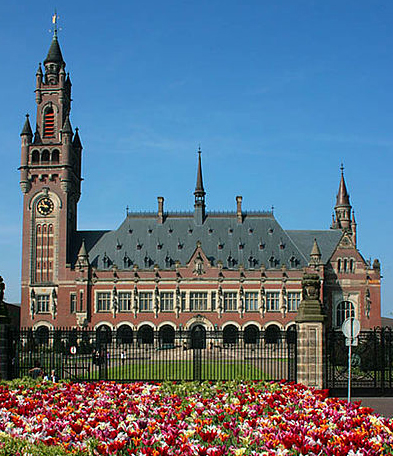Perspectives on the Rule of Law and the Environment.
Justice Anthony Kennedy on Law, Dignity and Freedom.
I am privileged to send this post from The Hague, the Netherlands. The Hague is the political center of the Netherlands but also the International City of Peace and Justice, home to over 130 international institutions, organizations, and non-governmental organizations (NGOs).

The Peace Palace houses the International Court of Justice, the Permanent Court of Arbitration, and the Hague Academy of International Law.
By http://commons.wikimedia.org/wiki/User:Lybil [GFDL, CC-BY-SA-3.0 or CC-BY-SA-2.5-2.0-1.0], via Wikimedia Commons
The Hague’s celebrated Peace Palace is 100 years old this year. Also sited in The Hague is the International Criminal Court, where war crimes and crimes against humanity are adjudicated.
I am here as part of a five attorney delegation from the American Bar Association’s Section of Environment, Energy, and Resources to participate in World Justice Forum IV, which has gathered over 550 individuals from 125 nations. The Forum is one activity organized by the World Justice Project (WJP), an NGO assessing, quantifying, and comparing how different nations apply and enforce the rule of law. We are blogging from the Forum; our collective insights and photos are here.
What is the rule of law? The WJP articulates it via four principles:
- The government and its officials and agents, as well as individual and private entities are accountable under the law;
- The laws are clear, publicized, stable and just, and are applied evenly and protect fundamental rights including the security of persons and property;
- The process by which the laws are enacted administered and enforced is accessible, fair, and efficient; and that
- Justice is delivered timely by competent, ethical, and independent representatives and neutrals who are of sufficient number, have adequate resources, and reflect the makeup of the communities they serve.
To realize its goal of advancing the rule of law, the WJP creates and maintains a Rule of Law Index (ROLI) which measures how individual nations provide the essential elements of a rule of law to their citizens. Notably, the ROLI does not specifically address environment, energy, and natural resource rule of law issues. While here at the Forum, our delegation is advancing with others of like interest plans to create a ROLI index tailored to the enactment, implementation, and enforcement of environmental laws.
Rule of law lives in the conscience of the people and is taught.
In thinking about all the ways strong and transparent laws promote a healthy and sustainable environment, our delegation has already identified areas where additional rule of law progress can be made, such as:
- Empowering civil society using new technology (photos, citizen monitoring and reporting of illegal discharges).
- Educating youth on environmental laws, requirements, and rights.
- Promoting environmental transparency in siting of new infrastructure and extractive industries.
- Protecting the rights and interests of indigenous peoples.
Effective rule of law lives in the conscience of the people and is taught. All of us should ask how we can better understand it and better teach it.
Each generation is the trustee of freedom for the next
We had the great honor to hear yesterday from U.S. Supreme Court Justice Anthony Kennedy, who frankly stated, “The law doesn’t belong to a bunch of lawyers and judges. It belongs to all of us. It is the people’s.” Flagging that class, race, and religious intolerance can adversely affect the rule of law, Justice Kennedy pressed the attendees to move quickly. “In a time of motion compression, we live in urgent times.”
Justice Kennedy was asked what is needed at the start to incubate rule of law:
Number one, you need a population of people that understands the importance of human dignity and the necessity to respect each man and each woman. The law must give us the capacity to do that . . . The whole idea of freedom is that you can define your destiny and have a good and fulfilling life and not have the government do it for you . . . Each generation is the trustee of freedom for the next. Trustees do not grab all the assets for themselves . . . Power and wisdom do not come from the government to the people; it is just the opposite.
Certainly, when it comes to the environment, we are indeed trustees for the future. The rule of law and its implementation will help us better execute our role
— <> —
 Alexandra Dapolito Dunn is Executive Director of the Association of Clean Water Administrators, former Assistant Dean of Environmental Law, Pace University School of Law, and Chair, American Bar Association Section of Environment, Energy, and Resources. @cleanwaterACWA
Alexandra Dapolito Dunn is Executive Director of the Association of Clean Water Administrators, former Assistant Dean of Environmental Law, Pace University School of Law, and Chair, American Bar Association Section of Environment, Energy, and Resources. @cleanwaterACWA










Trackbacks/Pingbacks